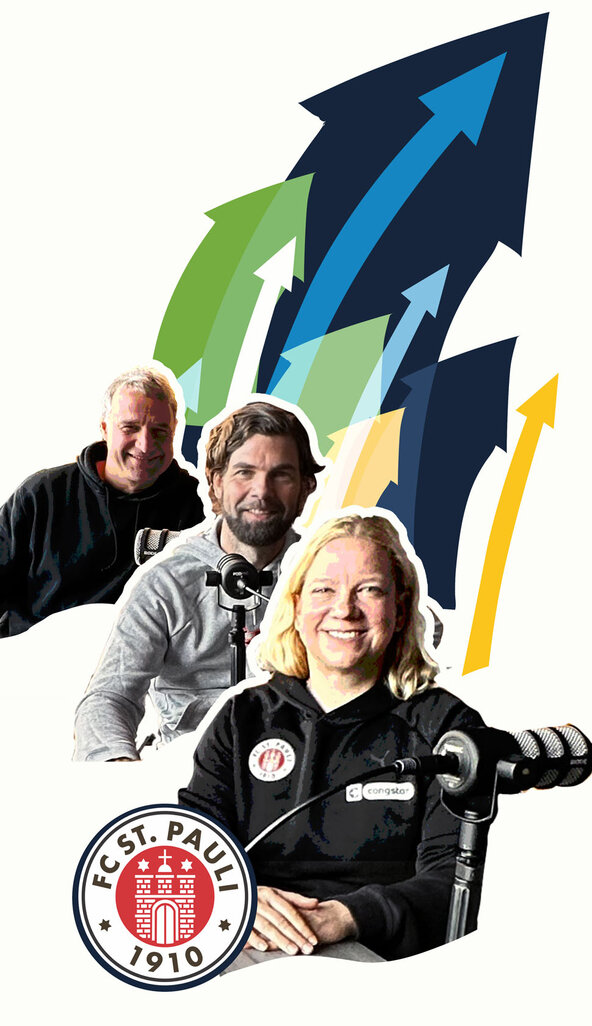
Oliver Bartelt: Sandra, St. Pauli is the first professional football club in the world to set up a co-operative. Why did they choose this model?
Sandra Schwedler: The idea was to stay true to our values and at the same time break new ground. St. Pauli stands for participation, independence and solidarity. The co-operative model allows us to do exactly that - fans and members become co-owners and everyone has one vote, regardless of the number of shares they hold. This allows us to make democratic decisions and avoid becoming dependent on large investors. This is crucial to maintaining our identity.
Oliver Bartelt: At DMK, we also embrace the co-operative model as a deeply democratic form of business, based on the principle that “what one cannot achieve alone, many can achieve together”. This approach is essential for us to encourage the participation of our members. In practical terms, this means that our agricultural co-operative brings together farmers who process and market their products together. This gives members control over their raw materials and ensures that the profits go directly back into their co-operative.
Marco Bode: Sandra and Oliver: How do your models work in practice?
Sandra Schwedler: The goal of the co-operative is to acquire a majority stake in the Millerntor Stadium and lease it to the club. With this income we can reduce existing debts, especially loans for the stadium and from Corona times. A share costs €850, of which €750 is for the share itself, €32 for administration fees and €68 for reserves. Members benefit from collective co-determination. The aim is to show that there are alternatives in professional football that do not rely on big investors and commercialisation.
Oliver Bartelt: It's exciting to see how you're interpreting the model of a co-operative in a modern way. At DMK, more than 4,000 farmers have joined forces to market their milk and products together. Our members don't want to sell their milk to just anyone; they want to process it in “their” dairy, so they have control over everything. This ensures that all business decisions are made collectively. And that at the end of the day, all the profits go back into our own coffers.
Sandra Schwedler: That is also a very important point for us at St. Pauli. We retain control. Investors could exert increasing influence - that would go against our idea of a different kind of football. It protects us from external pressure and ensures the integrity of the club.
It is also important to us that co-operatives are more crisis-resistant. The insolvency rate in Germany is only 0.1%. Acting together makes us more financially and structurally resilient. Co-operatives pursue the well-being of their members, not profit maximisation - this fits in with our philosophy at St. Pauli. Another advantage is transparency - decisions are disclosed and discussed, which builds trust. In professional football, where many fans feel increasingly alienated, this is an important factor.
Marco Bode: What other advantages does the model offer?
Sandra Schwedler: Football should belong to the people, not to corporations. This model ensures that our stadium remains in our hands. We can also tackle projects such as the expansion of the youth training centre and make a sustainable investment in the future.
Oliver Bartelt: Participation is also a very important issue at DMK. Of our more than 4,000 members, around 10% are permanently involved in important voluntary functions, from the supervisory board to the management board and the advisory board. This is where all the important decisions of our company are prepared, discussed and taken. A deeply democratic system.
Marco Bode: Who can become a member of St. Pauli?
Sandra Schwedler: Everyone is welcome - fans, members or sympathisers. Companies can also subscribe shares. The co-operative is transparent and inclusive. Participation is an opportunity to be part of something bigger and to actively shape the future of the club. But even those who subscribe to many shares have exactly one vote.
Oliver Bartelt: What are the next steps?
Sandra Schwedler: The first subscription period for the shares should run until the end of January 2025. We hope to raise up to 30 million euros to take over the majority of the Millerntorstadion operating company with the co-operative. It is important to us that this remains a shared journey, supported by people who believe in our values and want to see the club in the hands of its community. Further strategic projects will follow to strengthen FC St. Pauli in the long term.
Marco Bode: It seems that St. Pauli is once again taking on a pioneering role.
Sandra Schwedler: Very much so. We are demonstrating that economic success and values can go hand in hand. Our aim is to maintain a balance between professional football and community spirit and to inspire other clubs to tread new paths.
Oliver Bartelt: At DMK, the issue of new ways of thinking is of paramount importance. The dairy industry is in the midst of a major transformation process, which we are successfully managing together with our members. Our much-publicised successes in recent years in the areas of sustainability, animal welfare, climate protection and innovative foods are impressive proof of this.

